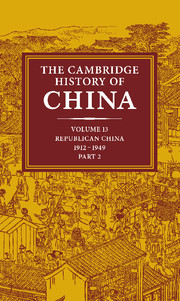Book contents
- Frontmatter
- 1 Introduction: perspectives on modern China's History
- 2 China's international relations 1911–1931
- 3 Nationalist China during the Nanking decade 1927–1937
- 4 The Communist movement 1927–1937
- 5 The agrarian system
- 6 Peasant movements
- 7 The development of local government
- 8 The growth of the academic community 1912–1949
- 9 Literary trends: the road to revolution 1927–1949
- 10 Japanese aggression and China's international position 1931–1949
- 11 Nationalist China during the Sino-Japanese War 1937–1945
- 12 The Chinese Communist movement during the Sino-Japanese War 1937–1945
- 13 The KMT-CCP conflict 1945–1949
- 14 Mao Tse-Tung's thought to 1949
- Bibliographical Essays
- Bibliography
- Conversion table: pinyin to Wade-Giles
- Index
- Republican China - physical features">
- References
2 - China's international relations 1911–1931
Published online by Cambridge University Press: 28 March 2008
- Frontmatter
- 1 Introduction: perspectives on modern China's History
- 2 China's international relations 1911–1931
- 3 Nationalist China during the Nanking decade 1927–1937
- 4 The Communist movement 1927–1937
- 5 The agrarian system
- 6 Peasant movements
- 7 The development of local government
- 8 The growth of the academic community 1912–1949
- 9 Literary trends: the road to revolution 1927–1949
- 10 Japanese aggression and China's international position 1931–1949
- 11 Nationalist China during the Sino-Japanese War 1937–1945
- 12 The Chinese Communist movement during the Sino-Japanese War 1937–1945
- 13 The KMT-CCP conflict 1945–1949
- 14 Mao Tse-Tung's thought to 1949
- Bibliographical Essays
- Bibliography
- Conversion table: pinyin to Wade-Giles
- Index
- Republican China - physical features">
- References
Summary
Modern China's fate has been intricately intertwined with the foreign policies of the powers, in particular Japan. Although historians nowadays may shun the detailed chronicling of wars and treaties relating to China (as in H. B. Morse's International relations of the Chinese Empire), this aspect of Chinese history is becoming more important in retrospect. After all, as Mary Wright pointed out in China in revolution, the presence of foreigners and their various activities on Chinese soil provided part of the milieu in which Chinese politics evolved in the twentieth century. Moreover, not only the maritime and ‘foreign presence’ described in volume 12 of this series, but also the contradictions and conflicts among the foreign powers, affected developments within Republican China. This chapter, and chapter 10 below, therefore look at the external context of twentieth-century Chinese history, beginning naturally with the collapse of the old order.
CONTEXT: DECLINE AND FALL OF THE CH'ING EMPIRE AS AN EAST ASIAN REGIONAL ORDER
The Ch'ing emperors' great achievement had been to assert their central power over the arid peripheral regions of Manchuria, Mongolia, Sinkiang and Tibet as well as over the heartland so densely populated by the Han Chinese. Military force, feudalism, religion and trade had all served the Ch'ing politics of empire, in mixtures that varied for each region and people. In all these regions of Inner Asia, Ch'ing rule had been set up by warfare and was maintained by garrisons. In Manchuria and Mongolia the emperor made the tribal chieftains his personal vassals.
Keywords
- Type
- Chapter
- Information
- The Cambridge History of China , pp. 74 - 115Publisher: Cambridge University PressPrint publication year: 1986
References
- 1
- Cited by

